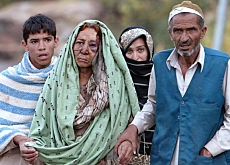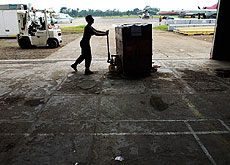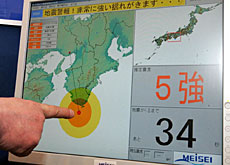Death toll rises after Pakistan earthquake

The death toll following the massive earthquake that struck India and Pakistan on Saturday is expected to be tens of thousands, many of them in Kashmir.
Switzerland has organised a first response to the catastrophe, sending three experts to evaluate the most urgent needs of the population, with more specialists on their way.
The death toll from the earthquake rose to more than 30,000 in worst-hit Pakistan on Sunday, as rescuers dug out hundreds of dead children buried under schools and found towns and villages reduced to rubble.
Striking out from the mountains of Pakistani Kashmir near the border with India, the quake was one of the strongest to hit the region in a century.
President Pervez Musharraf’s spokesman, Major-General Shaukat Sultan, said a further 40,000 people were injured in the 7.6-magnitude quake that struck mid-morning on Saturday, calling it the worst devastation in Pakistan’s history.
“There are many villages that have been wiped off the face of this earth,” said Sultan. He added that many areas had not been reached because landslides triggered by the quake had wiped out roads.
Huge tremor
The quake also battered Indian Kashmir, killing more than 300 people there, but it was Pakistan’s side of the disputed Himalayan region that was worst hit, a military official said.
The first tremor was followed over the next 18 hours by more than 20 aftershocks with magnitudes of between 4.5 and 6.3.
An official at the Pakistan Meteorological Department said it was the strongest earthquake in the region since the 1905 Kangra earthquake that killed 20,000 people in India’s Madhya Pradesh state.
Half of the Indian deaths were in Uri, the last big town on the road connecting the two sides of the violence-scarred region. The dead included 15 soldiers, some in bunkers close to a military ceasefire line.
Landslides blocked the road that connects Srinagar, the summer capital of Indian Kashmir, to the rest of India to the south. The Srinagar-Muzaffarabad road linking Indian and Pakistani Kashmir, reopened to traffic this year for the first time in nearly 60 years, was also blocked.
Aid
Like many countries, Switzerland reacted within hours. The Swiss Agency for Development and Cooperation (SDC) has sent three experts, who arrived in Islamabad on Sunday, to evaluate the needs of the population with the local authorities.
More specialists are on their way.
“Another six will leave [on Sunday],” said SDC spokesman Andreas Stauffer. “They should arrive on Monday and will deal mainly with drinking water and medical needs.”
A special flight has been chartered by the Swiss government to transport the experts as well as equipment. Two more catastrophe-prevention specialists are expected to make the trip in the next few days.
The three Swiss specialists already on the ground are working with four experts from the United Nations Disaster Assessment and Coordination team. Switzerland has also allocated emergency funds worth SFr1 million ($780,000).
The SDC bureau in Islamabad has also begun purchasing emergency supplies that it will distribute with local charities.
The population’s first needs are fresh water, medical supplies and blankets. Tents and temporary shelters could be shipped from Switzerland.
The Swiss will not be sending rescue teams for the moment, as Germany is already handling that issue, according to Jean-Philippe Jutzi, another SDC spokesman.
NGOs
Swiss non-governmental organisations and charities have also responded to the catastrophe.
The protestant charity, Heks, has set aside SFr100,000 for the victims of the quake in India, Pakistan and Afghanistan.
Swiss Solidarity, the fundraising arm of swissinfo’s parent company, the Swiss Broadcasting Corporation, has made available SFr100,000 to its local partners.
Catholic charity Caritas has handed over SFr150,000, while the Swiss Red Cross has given SFr250,000 to purchase emergency supplies.
swissinfo with agencies
Specialists were not surprised by the South Asia earthquake that struck on Saturday.
Tectonics – shifts in the earth’s crust – plays a major role in the region, where the Indian plate encounters the Eurasian plate, forming the Himalayas.
Tremors are frequent and massive earthquakes have taken place regularly over the past century.

In compliance with the JTI standards
More: SWI swissinfo.ch certified by the Journalism Trust Initiative


You can find an overview of ongoing debates with our journalists here. Please join us!
If you want to start a conversation about a topic raised in this article or want to report factual errors, email us at english@swissinfo.ch.